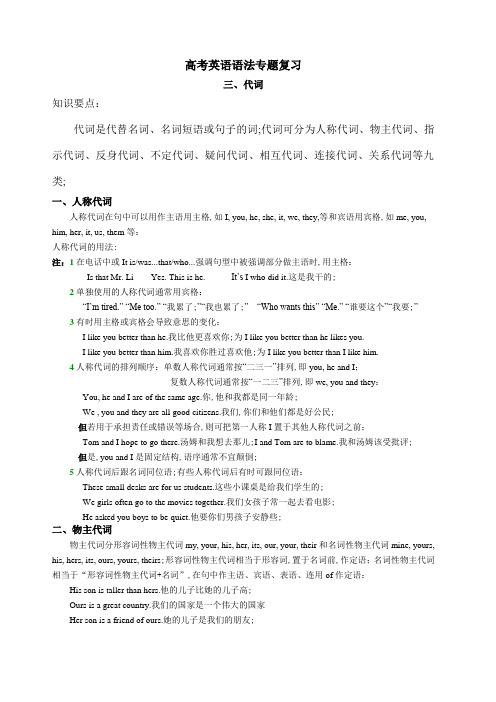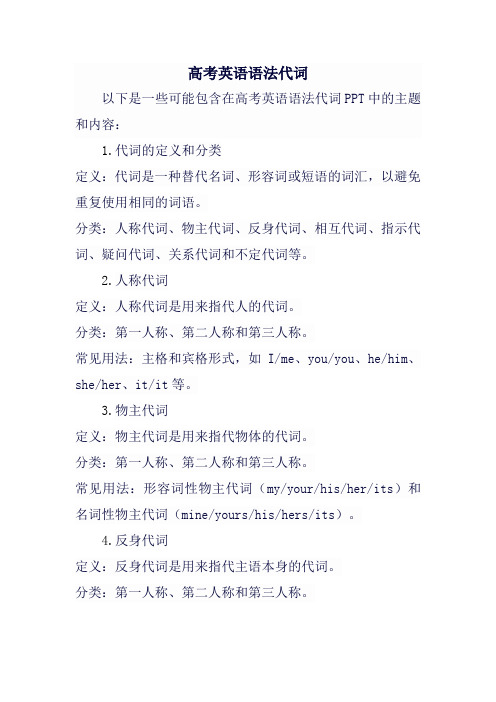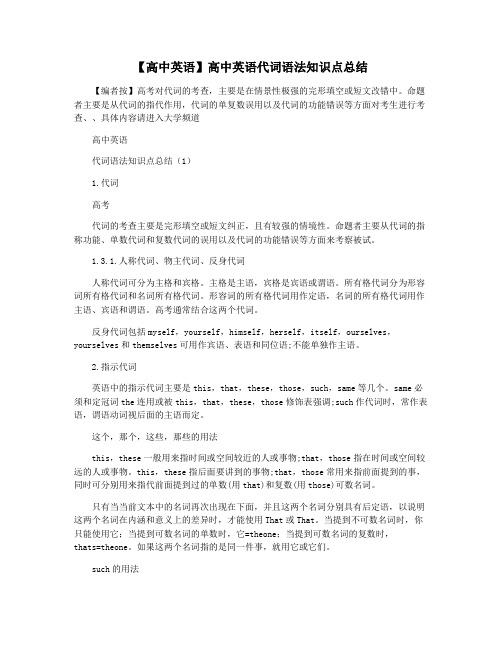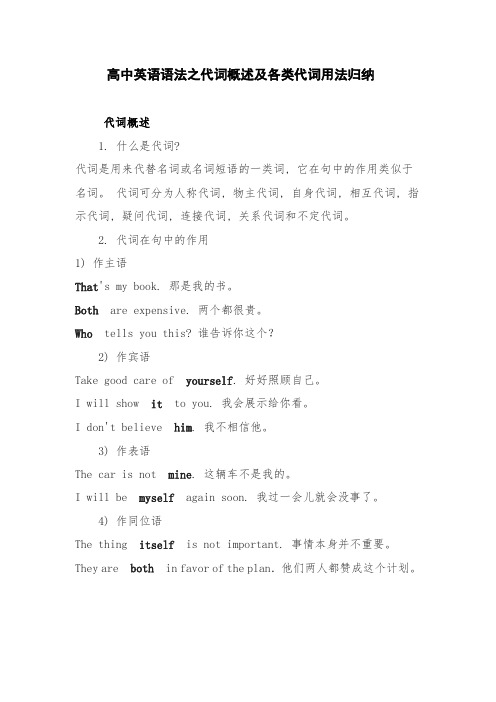高考英语语法精华总结 代词的用法
高考英语语法专题复习代词

高考英语语法专题复习三、代词知识要点:代词是代替名词、名词短语或句子的词;代词可分为人称代词、物主代词、指示代词、反身代词、不定代词、疑问代词、相互代词、连接代词、关系代词等九类;一、人称代词人称代词在句中可以用作主语用主格,如I, you, he, she, it, we, they,等和宾语用宾格,如me, you, him, her, it, us, them等:人称代词的用法:注:1在电话中或It is/was...that/who...强调句型中被强调部分做主语时,用主格:---Is that Mr. Li ---Yes. This is he. It’s I who did it.这是我干的;2单独使用的人称代词通常用宾格:“I’m tired.” “Me too.” “我累了;”“我也累了;”“Who wants this” “Me.” “谁要这个”“我要;”3有时用主格或宾格会导致意思的变化:I like you better than he.我比他更喜欢你;为I like you better than he likes you.I like you better than him.我喜欢你胜过喜欢他;为I like you better than I like him.4人称代词的排列顺序:单数人称代词通常按“二三一”排列,即you, he and I;复数人称代词通常按“一二三”排列,即we, you and they:You, he and I are of the same age.你,他和我都是同一年龄;We , you and they are all good citizens.我们,你们和他们都是好公民;但若用于承担责任或错误等场合,则可把第一人称I置于其他人称代词之前:Tom and I hope to go there.汤姆和我想去那儿;I and Tom are to blame.我和汤姆该受批评;但是,you and I是固定结构,语序通常不宜颠倒;5人称代词后跟名词同位语;有些人称代词后有时可跟同位语:These small desks are for us students.这些小课桌是给我们学生的;We girls often go to the movies together.我们女孩子常一起去看电影;He asked you boys to be quiet.他要你们男孩子安静些;二、物主代词物主代词分形容词性物主代词my, your, his, her, its, our, your, their和名词性物主代词mine, yours, his, hers, its, ours, yours, theirs;形容词性物主代词相当于形容词,置于名词前,作定语;名词性物主代词相当于“形容词性物主代词+名词”,在句中作主语、宾语、表语、连用of作定语:His son is taller than hers.他的儿子比她的儿子高;Ours is a great country.我们的国家是一个伟大的国家Her son is a friend of ours.她的儿子是我们的朋友;This is your pen. Mine is in the box.这是你的铅笔,我的在铅笔盒里;注:1 a friend of mine ours, yours, hers, his, theirs结构2 物主代词与own连用;表强调;也可用of one’s own置于名词后作定语:Mind your own business.别管闲事;I saw it with my own eyes.那是我亲眼看到的;I hope to have a room of my own. / I hope to have my own house.我希望有自己的房子;三、指示代词指示代词是用来指代或标记人或事物的代词,表示“这个,这些”“那个,那些”;在句中可作主语、宾语、表语、定语;单数:this, that;复数:these, those;为了方便学习将such,so也归于此类;I like these and he likes those.我喜欢这些,他喜欢那些;What I want to say is this.我想说的就是这点;注:1 指示代词用作主语和定语时,可指人或物;用作宾语和表语时,只指物;如:This is my father. 作主语,指人Do you know this作宾语,指物,译为“你知道这个情况吗2 刚提到的或已经完成的事情时用that,但是若要指下文将要发生或将要提到的事情通常用this:She married Jim, and that surprised me.她嫁给了吉姆,这使我感到很吃惊;I want to know this: Is he healthy我想知道这一点:他是否很健康;3 在打电话时,通常用this指自己,用that指对方:Hello. This is Jim. Is that John喂,我是吉姆,你是约翰吗4 such指代前面所述的这样的人或事;如:Such is Albert Einstein, a famous physicist, but a simple man. 这就是艾尔伯特,爱因斯坦,......5 so代替一个句子或短语表达的事情;a.在believe,expect,suppose,imagine,think等词后用so代替前文观点;表肯定、否定=not均可;b. 用于表示肯定的hope,I’m afraid后,代替前文提出的观点;四、反身代词反身代词是oneself根据所指词的人称、性别、单复数等变化的词单数:myself, yourself,himself, herself, itself, 复数:ourselves, yourselves, themselves,在句中可作宾语、表语、同位语,不能作主语; 注:1用作同位语加强被修饰词的语气,紧放在被修饰名词后,或句末:The box itself is not so heavy.箱子本身并不重;You yourself said so. / You said so yourself.你自己是这样说的;2用作宾语动词或for,of, in, by, to等介词的宾语:She could not make herself understood.她不能使别人听懂她的话;You’ll have to see if he has come for yourself. for one self 亲自,为自己The computer may shut off of itself. of oneself 自动的You shouldn’t leave the child at home by herself. b y oneself 独自,单独Jim isn’t bad in himself, but he likes playing tricks on others. in one self 本身He likes a table to himself. to oneself 独自占用3 用作表语:有时用于be, feel, seem, look等后作表语表示身体或精神处于正常状态:The poor boy was myself.那个可怜的孩子就是我自己;The ones who really want it are ourselves.真正想要它的是我们自己;I'm not quite myself these days.我近来身体不大舒服;I'll be myself again in no time.我过一会儿就会好的;4 含有反身代词的动词短语:devote oneself to=be devoted to 专心于;lose oneself=be lost in 迷失;seat oneself= be seated 坐下; express oneself 表达某人的思想; say for oneself 为自己找借口;say to oneself 心想; talkto oneself 自言自语; feel oneself 觉得正常; come to oneself 苏醒;五、疑问代词疑问代词包括who, whom, whose,which, what,在句中可用作主语、表语、宾语、定语等:1、who与whom的用法:前者为主格,用作主语、宾语,后者为宾格,用作宾语;Who spoke at the meeting Whom are you talking about口语中或作宾语的whom位于句首时,通常可用who代替,但whom前有介词时除外:Whom is the letter from2、whose的用法:表示“谁的”,既可用于名词前作定语,也可单独使用;在句中作主、宾、表、定语;Whose is better, yours or hers作主语Whose do you love better, yours or hers作宾语Tom has already taken his bag is this作表语Whose bag do you like作定语3、what和which的用法:有选择范围时,多用which;无选择范围或不明确时,多用what;拓展:what的习惯用法:1 What...for... 和What for 用于询问原因和目的;---What did you put it into the soup for --- It would improve the taste.你为什么...---I’m going to the grocery store. ---What for We still have enough food in the apartment.为何啊(2)What if...表示假设、建议、征求意见或疑虑;What if it rains while we are on the way(3)What do you mean by...表示愤怒、不满等情绪;What do you mean by shutting the door so loudly(4)What/How about...用于征求对方意见、询问对方的情况;(5)疑问词what构成的固定搭配;So what那又怎么样呢表示不感兴趣或认为不重要What next店员用语还要什么Guess what你猜怎么着用于引起他人的注意What can I do for you你要买借什么4、what和who的区别:一般来说;what问职业、地位等,who问姓名或关系等:Who is he他是谁What is he他是干什么的六、相互代词相互代词只有each other和one another,它们在句中通常只用作宾语:We should help each other.我们应该互相帮助;They respect one another.他们互相尊重对方;The sea and the sky seem to melt into each other.大海和蓝天似乎融为一体;注:1相互代词在句中通常只用作宾语,不可作主语,所以以相互代词为宾语的句子不能变为被动语态;2不要将相互代词误认为是副词,将其用作状语,如可说talk to each other,但不能说talk each other;3相互代词可以有所有格形式:The students borrowed each other's notes.学生们互相借笔记;4有时可分开用:We each know what the other thinks.我们都知道对方的想法;七、不定代词1.不定代词概说;英语的不定代词有all, each, both, either, neither, one, none, little, few, many, much, other, another, some, any, no,few,little, both, enough, every等,以及由some, any, no和every构成的合成代词即somebody, anyone, nothing等;在这些不定代词中,多数都能作主语、宾语、表语或定语,但是代词none以及由some, any, no和every构成的合成代词只能作主语、宾语或表语,不能作定语,而no和every则只用作定语;2.指两者和三者的不定代词;有些不定代词用于指两者如both, either, neither,有的不定代词用于指三者如all, any, none, every,注意不要弄混:Both of my parents are doctors.我的父母都是医生;All of the students are interested in it.所有的学生对此都很感兴趣;There are trees on any side of the square.广场的每一边都种有树;He has two sons, neither of whom is rich.他有两个儿子,都不富有;He has three sons, none of whom is rich.他有三个儿子,都不富有;注:each可用于两者、三者或三者以上,而every只用于三者或三者以上,因此用于两者时只能用each,不能用every;如不能说There are trees on every side of the road.3.复合不定代词的用法特点;复合不定代词包括something, somebody, someone, anything, anybody, anyone, nothing, nobody, no one, everything, everybody, everyone等;它们在句中可用作主语、宾语或表语,但不能用作定语;something, someone等和anything, anyone等的区别与some和any的区别一样,前者一般用于肯定句,后者一般用于否定句、疑问句或条件句参见any & some;具体使用时应注意以下几点:1复合不定代词受定语修饰时,定语应放在它们后面:There is nothing wrong with the radio.这收音机没有毛病;Have you seen anyone anybody famous你见过名人吗2指人的复合不定代词若用作主语,其谓语动词一般用单数,相应的人称代词和物主代词也用单数he, him, his 不一定指男性;但在非正式文体中常用复数代词they, them, their:Everyone knows this, doesn't he don't they人人都知道这一点,不是吗If anybody anyone comes, ask him them to wait.要是有人来,让他等着;3指事物的复合不定代词若用作主语,谓语动词只能用单数,相应的人称代词也只能用it,而不用they:Everything is ready, isn't it一切都准备好了,是吗4anyone, everyone等只能指人,不能指物,且其后一般不接of短语;若是指物或后接of短语,可用any one, every one 分开写:any one of the boys books孩子们书当中的任何一个本every one of the students schools每一个学生一所学校4.是any not还是not any;按英语习惯,any以及含有any的复合不定代词用于否定句时,它只能出现在否定词之后,而不能在否定词之前:误:Any one doesn't know how to do it.正:No one knows how to do it.任何人都不知道如何做它;误:Anybody Anyone cannot do it.正:Nobody No one can do it.这事谁也干不了;误:Anything cannot prevent me from going.正:Nothing can prevent me from going.什么也不能阻挡我去;5.不定代词与部分否定;不定代词all, both, every等与not连用时构成部分否定;若要表示完全否定,则需换用none, neither, no one等;比较:All of the students like the novel.所有这些学生都喜欢这本小说;Not all of the students like the novel.并不是所有这些学生都喜欢这本小说;All of the students don’t like the novel.并不是所有这些学生都喜欢这本小说;None of the students like the novel.这些学生当中没有一个喜欢这本小说;6.all, both, each等用作同位语;若用作主语同位语,主语可以是名词或代词;若用作宾语等其他成分的同位语,则宾语等成分必须是人称代词,而不能是名词:We have all read it.我们都读过他;all修饰的主语是代词The villages have all been destroyed.村庄都被毁了;all修饰的主语是名词They told us all to wait there.他叫我们都在那儿等;all修饰的宾语是代词但不能说:They told the men all to wait there. all修饰的宾语是名词不是代词7.so little与such little的区别;用so little还是such little取决于little的意思:若表示数量方面的“少”,则用so little;若表示形状体积的“小”,则用such little:He has so little time for reading.他读书的时间少得可怜;I've never seen such little boxes.我从未见过那样小的盒子;8.some与any的用法区别;一般说来,some用于肯定句中,any用于否定句和疑问句中;但是,在表示请求、邀请或征求意见的句子中,通常要用some而不用any:Would you like some cake吃点蛋糕吗Why not buy some bread为什么不买些面包呢Shall I get some chalk for you要我帮你拿些粉笔来吗注:any有时也用于肯定句中,此时表示“任何”:Any colour will do.任何颜色都行;Come any day you like.随便哪天来都可以;9.many与much的用法区别;两者都表示“许多”,但many修饰或代替可数名词复数,与few少数相对;而much用来修饰或代替不可数名词单数,与little少量相对;在口语中两者主要用于非肯定句中:Did you see many people there你在那儿看见许多人了吗We don't have much time.我们没有许多时间;在肯定句中,一般用a lot of, lots of, plenty of等代之;但在正式文体中有时也用于肯定句中;另外,若用作主语或主语的定语,或其前有how, too, as, so, a good, a great等修饰,也可用于肯定句中:Many of us left early.我们有许多人离开得很早;Much work has been done.许多工作都已经做了;You've given me too much.你已给我太多了;Take as many much as you want.你要多少拿多少;I asked her a great many questions.我问了她许多问题;10.few, a few与little, a little的用法区别;1few和a few后接可数名词的复数形式;few表示数量很少或几乎没有,强调“少”,含有否定意义;a few表示数量虽然少但毕竟还有,强调“有”,含有肯定意义:It is very difficult, and few people understand it.它很难,没有几个人能懂;It is very difficult, but a few people understand it.他虽难,但是有些人懂;2little和a little之后接不可数名词,其区别跟few和a few之间的区别相似:Unfortunately, I had little money on me.很不巧,我身上没带什么钱;Fortunately, I had a little money on me.幸好我身上带着一点钱;11.other, the other, another与others的用法区别:这些不定代词不仅在含义上有单复数之分,而且在用法上有泛指无the和特指有the之别;其用法区别可归纳如下:1指单数时,若泛指用another,若特指用the other:Give me another one.另外给我一个;Shut the other eye, please.请把另一只眼睛也闭上;2指复数时,若泛指用other后接复数名词,若特指用the other后接复数名词:There are other ways of doing it.做这事还有其他的办法;Where have the other students gone其他学生都到哪里去了3others永远表示复数意义且其后不能再接名词;其用法大致相当于“other+复数名词”,同样地the others大致相当于“the other+复数名词”:Other people Others may not think that way.别的人可能不这样想;He is cleverer than the others the other students in her class.他比班上其他学生聪明;4another一般只能表单数,且其后接名词也只能接单数名词;但是若其后有数词或few修饰时,则也可接复数名词:We need another few chairs.我们还需要几把椅子;In another two weeks it'll be finished.再过两个星期就可做完了;5与some对比使用时,用others此时与some同义:Some say yes, and others say no.有人说对,有人说不对;12.不定代词与语境考题;不定代词是高考的常考考点,有的不定代词考题出得比较灵活,不能死套规则,要注意结合语境来理解:1“Is ____ here” “No, Bob and Tim have asked for leave.”A. anybodyB. everybodyC. somebodyD. nobody若只是从表面来看,填空句是个疑问句,可能会误选A;但其实此题最佳答案应选B,因为下文的答句说“只有Bob和Tim请假了”,这说明问句是在查人数,故用Is everybody here 大家都到齐了吗2I agree with most of what you said, but I don't agree with _____.A. everythingB. anythingC. somethingD. nothing此句若从表面看,有可能误选B,因为填空句为否定句;但实际上最佳答案为A,因为上文说“我同意他说的大部分内容”,这与下文的but I don’t agree with everything但并不是同意他说的所有内容完全相符;3“Do you have _____ at home now, Mary” “No, we still have to get some fruit and tea.”A. somethingB. anythingC. everythingD. nothing答案选C,句意为“玛丽,现在家里东西都准备齐了吗”“还没有,我们还要买些水果和茶;”4“If you want a necklace, I’ll buy one for you at once.” “Oh, no. A necklace is not _____ that I need most. A. anythingB. somethingC. nothingD. everything此题容易误选A,机械地认为:something用于肯定句,anything用于否定句或疑问句;但是,此题的最佳答案是B,something在此的意思不是“某种东西”,而是指“那种东西”或“这种东西”,即心中最想要的那种东西相当于the thing;。
高考英语语法专题复习 :专题10 代词(代词知识点整理总结)

高考英语语法专项复习代词知识点整理总结距离高考还有一段时间,不少有经验的老师都会提醒考生,愈是临近高考,能否咬紧牙关、学会自我调节,态度是否主动积极,安排是否科学合理,能不能保持良好的心态、以饱满的情绪迎接挑战,其效果往往大不一样。
以下是本人从事10多年教学经验总结出的以下学习资料,希望可以帮助大家提高答题的正确率,希望对你有所帮助,有志者事竟成!养成良好的答题习惯,是决定高考英语成败的决定性因素之一。
做题前,要认真阅读题目要求、题干和选项,并对答案内容作出合理预测;答题时,切忌跟着感觉走,最好按照题目序号来做,不会的或存在疑问的,要做好标记,要善于发现,找到题目的题眼所在,规范答题,书写工整;答题完毕时,要认真检查,查漏补缺,纠正错误。
总之,在最后的复习阶段,学生们不要加大练习量。
在这个时候,学生要尽快找到适合自己的答题方式,最重要的是以平常心去面对考试。
英语最后的复习要树立信心,考试的时候遇到难题要想“别人也难”,遇到容易的则要想“细心审题”。
越到最后,考生越要回归基础,单词最好再梳理一遍,这样有利于提高阅读理解的效率。
另附高考复习方法和考前30天冲刺复习方法。
一、代词的分类二、代词的用法考点一it, that, one(s), those的用法1.it代替的是前面提到的同一事物,即同名同物,所代替的名词可以是可数名词,也可以是不可数名词。
如:I’d like to look at that atlas. May I borrow it?我想看看那张地图,我能借用一下吗(it代替可数名词atlas)?2.one叫作泛指代词代替的是前面提到的同名异物中的任何一个,所代替名词是可数名词单数,其前可带冠词与修饰语。
如果代替复数名词,则用ones。
如:①The population problem may be the greatest one in the world today.人口问题可能是当今世界上最大的一个问题。
英语代词的用法总结

英语代词的用法总结代词是英语语法中重要的一部分,它能够代替名词,起到简化和强调句子结构的作用。
在日常交流和写作中,熟练运用代词能够使表达更加简洁、流畅。
本文将总结代词的用法,以帮助读者更好地理解和运用代词。
一、人称代词人称代词主要用来代替人或物的称谓,分为主格和宾格两种形式。
主格人称代词用于主语位置,宾格人称代词用于宾语位置。
例如:- 主格人称代词:I, you, he, she, it, we, they- 宾格人称代词:me, you, him, her, it, us, them二、指示代词指示代词用来指示特定的人或物,分为近指和远指两种。
例如:- 近指代词:this, these- 远指代词:that, those三、反身代词反身代词用于强调主语或在句子中代替宾格。
例如:- 反身代词:myself, yourself, himself, herself, itself, ourselves, yourselves, themselves四、所有代词所有代词用来显示所有关系,表示所属关系。
例如:- 所有代词:mine, yours, his, hers, its, ours, yours, theirs五、相互代词相互代词用于表示交互关系,通常用于句子中作主语或宾语。
例如:- 相互代词:each other, one another六、疑问代词疑问代词用来提问特定的人或物。
例如:- 疑问代词:who, whom, whose, what, which七、关系代词关系代词用于连接两个句子或从句。
例如:- 关系代词:who, whom, whose, that, which八、不定代词不定代词用来泛指某个人或物,没有明确的指代。
例如:- 不定代词:someone, anyone, no one, everyone, something, anything, nothing, everything九、数量代词数量代词用来表示数量或次数。
高考英语语法代词

高考英语语法代词以下是一些可能包含在高考英语语法代词PPT中的主题和内容:1.代词的定义和分类定义:代词是一种替代名词、形容词或短语的词汇,以避免重复使用相同的词语。
分类:人称代词、物主代词、反身代词、相互代词、指示代词、疑问代词、关系代词和不定代词等。
2.人称代词定义:人称代词是用来指代人的代词。
分类:第一人称、第二人称和第三人称。
常见用法:主格和宾格形式,如I/me、you/you、he/him、she/her、it/it等。
3.物主代词定义:物主代词是用来指代物体的代词。
分类:第一人称、第二人称和第三人称。
常见用法:形容词性物主代词(my/your/his/her/its)和名词性物主代词(mine/yours/his/hers/its)。
4.反身代词定义:反身代词是用来指代主语本身的代词。
分类:第一人称、第二人称和第三人称。
常见用法:在动词短语中表示动作的主体,如myself/yourself/himself/herself/itself等。
5.相互代词定义:相互代词是用来指代两个人或多个物体之间的相互关系的代词。
常见用法:each other/one another表示“互相”之意。
6.指示代词定义:指示代词是用来指代较近的物体或概念的代词。
分类:基本型、所有格型和泛指型。
常见用法:this/that/these/those等。
7.疑问代词定义:疑问代词是在疑问句中用来引导名词性从句的代词。
分类:指人的who/whom/whose和指物的which/what等。
8.关系代词定义:关系代词是用来引导定语从句的代词。
分类:who/whom/whose/which/that等。
常见用法:在定语从句中代替先行词,并在从句中充当成分。
9.不定代词定义:不定代词是不指明代替任何特定名词或数量的代词。
分类:数量不定代词(some/any/enough/many等)和种类不定代词(something/anything/everything等)。
【高中英语】高中英语代词语法知识点总结

【高中英语】高中英语代词语法知识点总结【编者按】高考对代词的考查,主要是在情景性极强的完形填空或短文改错中。
命题者主要是从代词的指代作用,代词的单复数误用以及代词的功能错误等方面对考生进行考查、、具体内容请进入大学频道高中英语代词语法知识点总结(1)1.代词高考代词的考查主要是完形填空或短文纠正,且有较强的情境性。
命题者主要从代词的指称功能、单数代词和复数代词的误用以及代词的功能错误等方面来考察被试。
1.3.1.人称代词、物主代词、反身代词人称代词可分为主格和宾格。
主格是主语,宾格是宾语或谓语。
所有格代词分为形容词所有格代词和名词所有格代词。
形容词的所有格代词用作定语,名词的所有格代词用作主语、宾语和谓语。
高考通常结合这两个代词。
反身代词包括myself,yourself,himself,herself,itself,ourselves,yourselves和themselves可用作宾语、表语和同位语;不能单独作主语。
2.指示代词英语中的指示代词主要是this,that,these,those,such,same等几个。
same必须和定冠词the连用或被this,that,these,those修饰表强调;such作代词时,常作表语,谓语动词视后面的主语而定。
这个,那个,这些,那些的用法this,these一般用来指时间或空间较近的人或事物;that,those指在时间或空间较远的人或事物。
this,these指后面要讲到的事物;that,those常用来指前面提到的事,同时可分别用来指代前面提到过的单数(用that)和复数(用those)可数名词。
只有当当前文本中的名词再次出现在下面,并且这两个名词分别具有后定语,以说明这两个名词在内涵和意义上的差异时,才能使用That或That。
当提到不可数名词时,你只能使用它;当提到可数名词的单数时,它=theone;当提到可数名词的复数时,thats=theone。
超实用高考英语复习:高考语法填空抢分热点之代词(解析版)

高考语法填空抢分热点之代词一、考点精讲代词:1.人称代词分主格和宾格。
2.物主代词包括形容词性物主代词和名词性物主代词。
形容词物主代词修饰名词;名词性物主代词单独使用,相当于形容词物主代词加名词,后面不能再跟名词。
3.反身代词。
反身代词的固定搭配:devote oneself to“致力于,献身于”,其中to是介词;say to oneself“自言自语”;help oneself to“随便吃,自行取用”;by oneself“独自地,单独”;make oneself done“使某人自己被”;leave one by oneself“把某人自己单独留下”;enjoy oneself“过得愉快”;behave oneself“举止规矩”;come to oneself“苏醒过来”。
4.不定代词。
指人的不定代词:someone,anyone,somebody,anybody,everyone,everybody,nobody,no one;指物的不定代词:something;anything;everything;nothing;none既可指人也可指物,表示“一个也没有”或“一点也没有”。
5.it的用法(1)it作形式主语或形式宾语,代指动词不定式、动名词、名词性从句。
(2)用于强调句型:It is/was ...that/who...例如:It was he that/who broke the door.(是他弄坏的门);It was not until his father came back that he left home.(直到他的父亲回来,他才离开的家。
)温馨提示:这个句型不能强调谓语动词,强调谓语动词时应该用:助动词do/does/did+动词原形,意为“确实,务必,一定”。
例如:He did break the door.(他确实弄坏了门。
)(3)it的固定搭配:When it comes to...“当谈到......的时候”,其中to是介词;make it“成功做成某事”;as it is “事实上,照原样”;get it“明白了”;put it“叙述,说明”;see to it that,意为“注意,务必,一定要做到”。
高考英语语法知识总结代词

高考英语语法知识总结(代词)如下:代词在近几年高考试题中的复现率为100%,每年至少测试一道题。
测试代词常用对话形式,构成特定语境,考查考生灵活运用代词的能力。
代词指代的范围、作主语时主谓一致的用法、易混不定代词的细微差别都是高考的必考点。
其中不定代词one,the one,ones与that,those,it的用法区别。
考点一、考查one(s), that, those, it的用法[考点解读]● one泛指一个人或物。其复数形式为ones。 one和the one作同位语时,如果与其同位的词语是特指,则用the one;如果是泛指,则用one,。● that指代前面提到过的名词,常有后置定语。 that的复数形式是those。 that可指代单数可数名词(= the one), 也可指代不可数名词,或指代前面提到过的一件事。● it可指代前面提到过的一个名词,如例7;指代一件事,如例8;指代不明性别的婴儿或不明确的人,也可指代时间、天气、距离等0。二、考查all, both, either, neither, none, no one的用法[考点解读]● both表示“两个人或物都”,具有肯定含义; either表示“两者中任何一个”,如例13; neither表示“两者都不”。● all表示“全部”,指三者或三者以上的人或物,;all也可笼统地表示“一切,所有”, none表示“三者或三者以上的人或物的全部否定”,在与of连用或回答how many/much的提问时只能用none, no one表示“没有一个人”,三、考查another, the other, others, the others的用法[考点解读]● another泛指三个或三个以上的人或物中不确定的另一个,如例19。another还可以作形容词,表示“另一个的”● the other指已知的两个人或物中的另一个● others和“other + 名词”均泛指“别的人或物”● the others指“一定范围内其余的人或物”,如例23。如果被指代的名词是不可数名词,则用the rest替代,四、考查(a) little, (a) few, some, any的用法[考点解读]● few和little可用作代词和形容词。 few和a few可以修饰或代替可数名词复数。 few有否定含义, a few有肯定含义, little和a little可以修饰或代替不可数名词。 little有否定含义, a little含肯定含义,。● some和any表示“一些”,可用作代词和形容词。 some用于肯定句,如例31; any用于否定句、疑问句和条件句中, some也可用于疑问句,如例32和例33; any也可用于肯定陈述句中,表示“任何一个”,五、考查something, somebody, someone, anything, anybody, anyone, nothing, nobody, everything, everybody的用法及它们与else的搭配[考点解读]● 由some和any构成的不定代词的用法和some和any的用法基本一致。● nothing和nobody/no one表示全部否定。● 无论在肯定句、否定句还是疑问句中, everything和everyone (everybody) 都表示“全部,所有”。● 不定代词后跟else时,表示“另外的,其他的”;形容词修饰something/anything/nothing时,应置于不定代词之后。以上不定代词连写时,不和of连用,every one可和of连用。【高考英语代词语法知识精选试题】名校模拟题及其答案1. I agree with most of what you said, but I don’t agree with______.A. everythingB. anythingC. somethingD. nothing2. “What do you think of them?” “I don’t know _____ is better, so I’ve taken _____ of them.”A. what, bothB. what, noneC. which, both C. which, none3. “Would you like a cup of coffee or a glass of beer?” “____ will do, but milk is _____ popular with me.”A. Neither, notB. Both, moreC. Either, the mostD. All, the most4. I read about it in some book or other, does it matter _____ it was?A. whereB. whatC. howD. which5“Who told you?” “Oh, somebody or other, I’ve forgotten_____.”A. whatB. whenC. whichD. who6.Some of the students were late for the meeting, but I can’t remember _____.A. whatB. whenC. whichD. whom7. These trousers are dirty and wet —I’ll change into my_____.A. anotherB. trousersC. othersD. other8. Her lecture was hard to follow because she kept jumping from one subject to _____.A. otherB. the otherC. the othersD. another9. There are four bedrooms, ______ with its own bathroom.A. allB. eachC. everyD. either10. “It’s said that he is a wise leader.” “Oh, no, he is_____ but a wise leader.”A. anythingB. anyoneC. anybodyD. anywhere11.I didn’t make clear when and where the sports meet would be held.A.this B that C it D one12 To tell you the truth..really don't like when people talk with you with their eyes stating into the sky.A.which B that C it D.what13.一Which one can I take?一You can take of them;I’ll keep none.A.bothB.anyC.eitherD.all14.一Which coat would you prefer.sir?一I’ll take ,to have n change so metimes.A.allthemB.them dlC.both them D them b0Ih15.The movie is boring;it is,in fact,rather exeiting and interestingA anything butB nothing butC no moreD all but16 Alan sold most of his belongings.He has hardly left in the houseA.everythingB.anythingC.nothing D something17.I have been lived in Shanghai for two years.butI haven’t covered of the cityA.anythingB.much C many D plenty18.She kept looking behind to see if she was being followedA her B.herself C.her own D.she19.All of us want very much to see these recommended movies,especially you referred to jusl now.A asB whichC the oneD that20.If a studem can make what has been learned whether in class of from social practice ,he will make steady progress.A heB himC himselfD his21.一Do you want tea or coffee?一 really don't mindA.None B Neither C Either D All22.The manager believes prices will not rise by more than four percent.A.any other B the other C another D other23.The manager was very angry,for he had sent his business partner two thousand machines yesterdy,half of unqualified.A.whom B what C them D.which24一Did you visit many places while you were in Canada?一Yes,A.afew quite B only few C.only afew D quite few25 In somecountries, is callede quality does not really mean equal rights for all peopleA thatB whatC whichD how26一May I have a glass of beer.please?一Beer?Sorry,there is left,but would you mind having,some juice instead?A none B.no one C nothing D few27.一When can we goto visit you?一Anytime you feel likeA.one B it C so D thal28 We need a more capable leader, with strong will as well as good humour.A who B.that C.one D.which29.The number 2008 is a special number, I think,that will be remembered hy the Chinese forever.A.which B what C one D.it30.一How do you like his wife?一She is like a good housekeeper,for the children's room is always in a terrible mess.A SomebodyB nobodyC something D.nothing——答案与解析——1【解析】此题应选 A,注意前文的 I agree with most of what you said(我同意你说的大部分内容),其后的not 与 everything 构成部分否定,意为“不是所有的都同意”,前后两部分用转折连词 but 连接,语气通顺、连贯。
高中英语语法之代词概述及各类代词用法讲义

高中英语语法之代词概述及各类代词用法归纳代词概述1. 什么是代词?代词是用来代替名词或名词短语的一类词, 它在句中的作用类似于名词。
代词可分为人称代词, 物主代词, 自身代词, 相互代词, 指示代词, 疑问代词, 连接代词, 关系代词和不定代词。
2. 代词在句中的作用1) 作主语That's my book. 那是我的书。
Both are expensive. 两个都很贵。
Who tells you this? 谁告诉你这个?2) 作宾语Take good care of yourself. 好好照顾自己。
I will show it to you. 我会展示给你看。
I don't believe him. 我不相信他。
3) 作表语The car is not mine. 这辆车不是我的。
I will be myself again soon. 我过一会儿就会没事了。
4) 作同位语The thing itself is not important. 事情本身并不重要。
They are both in favor of the plan.他们两人都赞成这个计划。
5) 作呼语You stand here and wait for the bus. 你站在这儿等公车吧。
Be patient, everyone. 大家都耐心点吧。
6) 作定语That's my glasses. 那是我的眼镜。
I'll buy that umbrella.人称代词1. 人称代词的词汇a) 人称代词主格 (在句中作主语)单数第一人称: I (我)单数第二人称: you (你)单数第三人称: he, she, it (他,她,它)复数第一人称: we(我们)复数第二人称: you(你们)复数第三人称: they (他们/她们/它们)b) 人称代词宾格 (在句中作宾语)单数第一人称: me (我)单数第二人称: you (你)单数第三人称: him, her, it(他,她,它)复数第一人称: us(我们)复数第二人称: you(你们)复数第三人称: them (他们/她们/它们)2. 人称代词在句中的作用1) 作主语I am a student. 我是一名学生。
- 1、下载文档前请自行甄别文档内容的完整性,平台不提供额外的编辑、内容补充、找答案等附加服务。
- 2、"仅部分预览"的文档,不可在线预览部分如存在完整性等问题,可反馈申请退款(可完整预览的文档不适用该条件!)。
- 3、如文档侵犯您的权益,请联系客服反馈,我们会尽快为您处理(人工客服工作时间:9:00-18:30)。
代词用法
一、代词分类
人称代词物主代词反身代词指示代词不定代词疑问代词连接代词关系代词
I me my mine self this some who 名词从句定语从句
二、人称代词:谁主格宾格
并列人称代词的排列顺序:单数人称第二人称—第三人称—第一人称you,he and I
复数人称第一人称—第二人称—第三人称we,you and they 三、物主代词:表示所有关系谁的形容词性名词性my mine
形容词性物主代词与own连用表示强调I saw it with my own eyes.
用定冠词the代替形容词性物主代词表示身体的某个部位
Touch sb on the head hit sb on the nose strike sb in the face take/catch/pull sb by the arm/head on 表面的,很硬by 顺手牵羊in 内部的,软的部位
名词性物主代词做主语、表语、宾语
四、反身代词表示自己self(自己)
做同位语,表强调(自己,亲自),要重读在名词或代词之后或句末My mother made the shoes herself.
固定搭配:take care of oneself 保重enjoy oneself by oneself 单独地of oneself 自动地for oneself 给自己in oneself 本性、本身between ourselves 天知地知你知我知among themselves 在…之间help youself
五、指示代词这个那个这些那些this that these those
六、疑问代词who whom whose which what
谁介词之后用whom
What which 前者指人,后者指物;which是在有限的范围内选择,而what泛指哪一类Which book do you like best? What books do you like best?
七、连接代词引导名词性从句,主语、宾语、表语和定语who, whom ,whose, what ,which Who will teach you English is still unknown.
八、关系代词引导定语从句,又在从句中担任某种成分:作用:1、引导定语从句,修饰一个名词或代词(即先行词), 2、代替先行词在从句中担任主语、宾语、定语或表语
九、不定代词不确定而笼统地表示某些人、某些事物的代词
Both either neither all none every(每一个,侧重整体) each(侧重个体)
Other another every other line every other day (每隔)
* Every student should study hard. Each student has a book.. (人手一本书)
few a few little a little many much a lot lots of many a (第三人称单数) 相互代词each other one another
形容词性与名词性
Others another the other(两者中的另一个) the others some others
Some 肯定any 否定一些(any 肯定句中表示“任何的”)
当疑问句表示请求、建议、反问或希望得到肯定答复时,some及其复合词可用于疑问句
Would you like some coffee ?
Some any 修饰可数名词单数certain(某个) any(任何一个)
One 代替同类不同物it 代替提到的那一个
it 做形式主语和形式宾语It is no use crying. I found it easy to answer the question. 句型:different hard easy possible necessary important (for)
表示品质特征,nice kind wise clever foolish stupid bright wrong silly
好,傻,聪明,笨带有感情色彩的词
固定句型
形式宾语think consider mke feel find
强调句型it is(was)+被强调部分+ that(who)。
